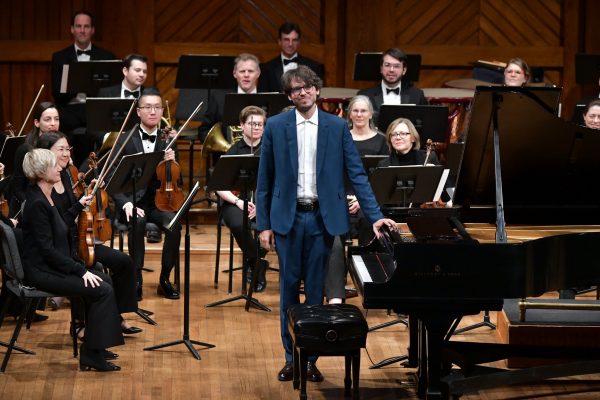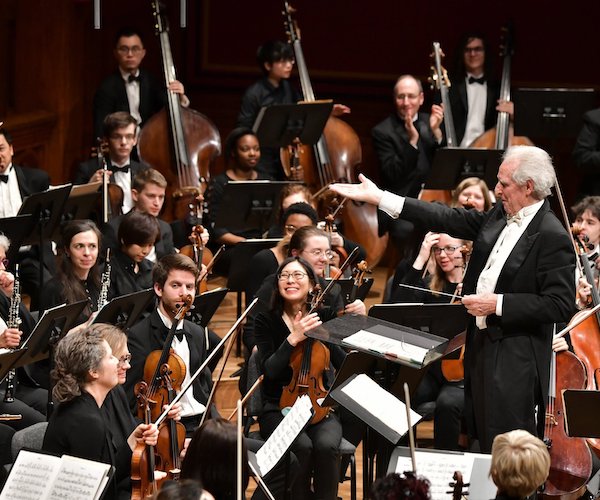Concert Review: Lucas Debargue and the Boston Philharmonic at Sanders Theatre
By Jonathan Blumhofer
A pianist of real character and refinement – plus a huge career in Europe – Lucas Debargue was on hand to lend his musicianship to a relatively rare outing of Franz Liszt’s Piano Concerto no. 2.

Lucas Debargue and the Boston Philharmonic Orchestra at Sanders Theatre at Harvard University. Photo: Paul Marrotta.
It’s hard to argue with the lineup of soloists Benjamin Zander and the Boston Philharmonic Orchestra (BPO) have brought to town this season. Their trend of finding and presenting some of the most striking artists of the day continued Thursday night at Sanders Theatre with the local debut of Lucas Debargue. A pianist of real character and refinement – plus a huge career in Europe – Debargue was on hand to lend his musicianship to a relatively rare outing of Franz Liszt’s Piano Concerto no. 2.
Premiered in 1857, the Liszt Second turns the piano concerto genre on its head, cast as it is in a single continuous movement (instead of three or four individual ones) and generally eschewing glittering, bravura displays for something a bit more contemplative (though its technical difficulties remain Herculean).
Often held to be shallow and bombastic, the piece has an ardent defender in Zander, whose pre-performance remarks offered a robust justification of the score, calling it one of Liszt’s true, visionary “hits.” Thursday, he backed up his words with a reading that overflowed with color and fantasy.
For this effort, Debargue proved the perfect collaborator. He’s a pianist of terrific facility, who’s equally comfortable as a chamber musician and no-holds-barred soloist, and his performance on Thursday was strongly directed, as well as precisely articulated and carefully voiced. Indeed, the lightness of Debargue’s touch was, at times, astonishing: the opening of the Concerto’s short final section, for instance, had a kinetic, elfin quality that simply shimmered.
At the same time, Debargue drew a big, commanding tone and plenty of character from the keyboard when needed. The piano’s first unaccompanied episode swaggered. The martial writing later on snapped. And the score’s several introspective sections floated dreamily.
Throughout, the BPO played with full-bodied tone – the opening woodwind phrase was beautifully sculpted – and excellent rapport with Debargue. Liszt’s crafty manner of treating the orchestra as, essentially, a large chamber ensemble, came across vividly, too, and the ensemble solos sang brightly, led by principal cellist Rafael Popper-Keizer’s melting turns.
Afterwards, Debargue rewarded a robust ovation with a brilliantly dispatched pair of encores: Milosz Magin’s aphoristic “Nostalgie du pays” and Domenico Scarlatti’s whimsical Sonata K. 24. One hopes he’ll be back in town soon and regularly.
Following intermission, Zander and the BPO exchanged one mountaintop for another, delivering a surging account of Antonin Dvorak’s turbulent Symphony no. 7.
A flexible approach to phrasing and tempo allowed this canonic favorite to breathe in an uncommonly natural way, yet the BPO’s playing was anything but flabby. Quite the opposite: the ensemble, led by its world-class woodwind and brass sections, dug into Dvorak’s writing with an intensity that – either by dint of the intimacy of the theater or sheer engagement with the music (or, most likely, both) – was visceral.

Conductor Benjamin Zander with the BPO at Sanders Theatre at Harvard University. Photo: Paul Marrotta.
The opening movement was marked by a strong sense of shape and character, building to a furious apex before suddenly winding down.
Zander’s pliable shaping of the second drew out the serene melancholy of its opening subject. Here, too, dramatic moments were strongly etched, but never at the expense of the music’s underlying lyrical impulses, as highlighted by Peggy Pearson’s winsome accounts of its oboe solos.
The punchy (and often subtle) rhythmic games of the Scherzo danced energetically, while its stormy affect never fully subsided, even in the bucolic trio.
In the finale, the orchestra’s playing was tautly rhythmic and highlighted by a thrilling buildup to the movement’s coda.
To start off the night, the BPO turned to Zoltán Kodály’s Dances of Galánta. Arguably the composer’s strongest orchestral piece, the 1933 Dances channel the folk music of Kodály’s native Hungary with an alacrity and brilliance – also, concision – that, in a good performance, can’t fail to leave a strong impression.
Thursday’s reading was very fine, indeed, brimming with soul, atmosphere, and virtuosic playing.
Rane Moore’s opening clarinet solos were the picture of rhapsodic passion. The strings’ execution of the concluding dances were correspondingly zesty and spirited. In between, the work’s other orchestral solos – particularly those from piccoloist Mary Kay Robinson, principal flute Lisa Hennessy, and oboist Pearson – were discreetly accompanied by the larger group.
And, while the Dances’ lyrical climaxes were each fervent and strong, the BPO painted its delicate touches (like the dovetailing woodwind lines during the interlude before the coda) with exquisite care.
Jonathan Blumhofer is a composer and violist who has been active in the greater Boston area since 2004. His music has received numerous awards and been performed by various ensembles, including the American Composers Orchestra, Kiev Philharmonic, Camerata Chicago, Xanthos Ensemble, and Juventas New Music Group. Since receiving his doctorate from Boston University in 2010, Jon has taught at Clark University, Worcester Polytechnic Institute, and online for the University of Phoenix, in addition to writing music criticism for the Worcester Telegram & Gazette.
Tagged: Benjamin-Zander, Boston Philharmonic Orchestra

What a false representation. The pianist was unable to play. Small sound and mamy times wasn’t together with the orchestra. Were you at the concert or just made it up. Shame for articles like this one.
You don’t know what is good.
Lucas Debargue has recently won the Tchaikovsky Festival Prize, one of the most prestigious piano awards in the world. You be the judge, check his UTUBE performances; can he play? Oh yes, he has the depth of a true master and the talent of a genius.
In addition, he recently played with the Boston Philharmonic Orchestra at Jordan Hall and I suggest you watch for additional local performances and recordings with the Boston Philharmonic Orchestra with Maestro Zander.
Another very favorable review from BMint …
https://www.classical-scene.com/2020/02/21/balkanization/